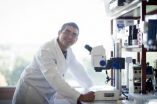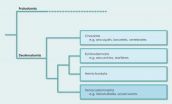(Press-News.org) Scientists from the Walter and Eliza Hall Institute have begun to unravel how blood stem cells regenerate themselves, identifying a key gene required for the process.
The discovery that the Erg gene is vitally important to blood stem cells' unique ability to self-renew could give scientists new opportunities to use blood stem cells for tissue repair, transplantation and other therapeutic applications.
Professor Doug Hilton, Dr Samir Taoudi and colleagues from the institute's Molecular Medicine and Cancer and Haematology divisions led the study. Dr Taoudi said the research aimed to understand how blood stem cells are made.
"One of the key features of blood stem cells, one that could be exploited for therapeutic use, is their ability to regenerate or renew themselves," Dr Taoudi said. "However, relatively little is known about how this occurs, or the molecular pathways that specifically control regeneration."
Blood stem cells are required to produce and maintain the blood system throughout an organism's lifetime. They are multipotent cells, meaning they are able to form any cell of the blood system (but not other cells), and they self-renew, so they are a source of endless supply. However, one major barrier to their therapeutic use is that the cells can only be isolated in numbers too low for practical use and efforts to expand the number of cells often causes them to turn into more mature cells.
"At the moment, if you take stem cells from a person and try to expand them, many of the stem cells lose their ability to regenerate," Dr Taoudi said. "The practical aim of our research is to find ways in which you could take stem cells collected from bone marrow or cord blood and 'switch on' expression of particular sets of genes, encouraging the stem cells to expand, essentially creating your own endless supply of blood stem cells."
Institute researchers had previously discovered that ERG was vital for the proper function of adult blood stem cells. They decided to look at blood stem cells in a developing embryo, a time when the cells are particularly active, to determine ERG's role in stem cell production and maintenance.
"We found that during development, ERG was not needed for the original blood stem cells to be made, or to produce mature blood cells," Dr Taoudi said. "But without ERG, these new blood stem cells rapidly decreased as they divided to produce more blood, so that they were almost completely exhausted by the time the mouse was born."
Further testing revealed that two other genes important in embryonic development, GATA2 and RUNX1, were controlled by ERG at the blood producing stage of development.
"These genes are called transcription factors, they are the 'switches' that turn on and off other genes," Dr Taoudi said. "Individually, these genes are not essential for regeneration, but if you lose both, the stem cells are quickly exhausted. This is a key part of the puzzle, but we will continue to work to find out how these genes directly control self-renewal, and the signals that actually tell the stem cell to regenerate."
Dr Taoudi said that although the finding had promise for the future therapeutic use of blood stem cells, there was still a lot of work to be done.
"We have found part of the pathway required for the expansion of blood stem cells under normal conditions, but from a translation perspective, we still need to establish whether increasing expression of these genes will actually lead to expansion in a culture dish," he said.
INFORMATION:
The study, published in the February edition of Genes and Development, was funded by the National Health and Medical Research Council, the Australian Cancer Research Foundation, the Australian Stem Cell Centre, the Australian Research Council, the Sylvia and Charles Viertel Charitable Foundation and the Victorian Government.
Erg gene key to blood stem cell 'self-renewal'
2011-02-17
ELSE PRESS RELEASES FROM THIS DATE:
Xenacoelomorpha -- a new phylum in the animal kingdom
2011-02-17
An international team of scientists including Albert Poustka from the Max Planck Institute for Molecular Genetics in Berlin has discovered that Xenoturbellida and the acoelomorph worms, both simple marine worms, are more closely related to complex organisms like humans and sea urchins than was previously assumed. As a result they have made a major revision to the phylogenetic history of animals. Up to now, the acoelomate worms were viewed as the crucial link between simple animals like sponges and jellyfish and more complex organisms. It has now emerged that these animals ...
Tau-induced memory loss in Alzheimer's mice is reversible
2011-02-17
VIDEO:
To test their capacity to learn, the mice are trained to find an underwater platform which is not visible to them from the edge of a water basin. The swimming...
Click here for more information.
Amyloid-beta and tau protein deposits in the brain are characteristic features of Alzheimer disease. The effect on the hippocampus, the area of the brain that plays a central role in learning and memory, is particularly severe. However, it appears that the toxic effect of tau ...
Insects hold atomic clues about the type of habitats in which they live
2011-02-17
Scientists have discovered that insects contain atomic clues as to the habitats in which they are most able to survive. The research has important implications for predicting the effects of climate change on the insects, which make up three-quarters of the animal kingdom.
Applying a method previously only used to examine the possible effects of climate change on plants, scientists from the University of Cambridge can now determine the climatic tolerances of individual insects. Their research was published today, 16 February, in the scientific journal Biology Letters.
Because ...
Researchers link gene mutations to Ebstein's anomaly
2011-02-17
Ebstein's anomaly is a rare congenital valvular heart disease. Now, in patients with this disease, researchers of the Academic Medical Center Amsterdam in the Netherlands, the University of Newcastle, UK and the Max Delbrück Center for Molecular Medicine (MDC) Berlin-Buch have identified mutations in a gene which plays an important role in the structure of the heart. The researchers hope that these findings will lead to faster diagnosis and novel, more specifically targeted treatment methods (Circulation Cardiovascular Genetics, DOI: 10.1161/CIRCGENETICS.110.957985)*.
Ebstein's ...
Build your online networks using social annotations
2011-02-17
Researchers at Toshiba are working on a way of finding clusters of like-minded bloggers and others online using "social annotations". Social annotations are the tags and keywords, the comments and feedback that users, both content creators and others associate with their content. Their three-step approach could help you home in on people in a particular area of expertise much more efficiently and reliably than simply following search engine results. The same tools might also be used in targeted marketing.
Users of photo gallery sites, such as Flickr (http://www.flickr.com/) ...
Water softeners not found to improve childhood eczema
2011-02-17
The first study of its kind in the world — involving 336 children aged between six months and 16 years old — has shown that installing a water softener for three months brings no additional relief for eczema sufferers.
Up to one fifth of all children of school age have eczema, along with about one in 12 of the adult population. Anecdotal reports from patients have suggested that hard water may worsen atopic eczema. Population surveys have also suggested a possible link between atopic eczema prevalence and the degree of water hardness.
It had been hoped that water softeners ...
Treatment for manic-depressive illness restores brain volume deficits
2011-02-17
Philadelphia, PA, 16 February 2011 - Lithium, introduced in the late 1940's, was the first "wonder drug" in psychiatry. It was the first medication treatment for the manic and depressive episodes of bipolar disorder and it remains among one of the most effective treatments for this disorder.
In the past 15 years, as molecular mechanisms underlying the treatment of bipolar disorder began to emerge, basic research studies conducted in animals began to identify neuroprotective and perhaps neurotrophic effects of this important medication.
The identification of these ...
Study looks into evolution of breast cancer in Spain
2011-02-17
Pioneering Spanish provinces in terms of early prevention of breast cancer, such as Navarre and the Basque Country, record lower death rates, although the trend is towards the figures levelling out all over Spain. These are the results of a study carried out by Spanish researchers, which analyses the number of women who died between 1975 and 2005.
"The Canary Islands, Balearic Islands, some parts of Catalonia, Valencia and Murcia, as well as the south west region, have higher breast cancer death rates, although there is a trend towards the geographical differences disappearing", ...
President Obama's 2012 budget: Nation's future depends on science, innovation
2011-02-17
WASHINGTON—February 16, 2011— Research!America's board chair, former Congressman John Edward Porter, and president, Mary Woolley, thanked President Obama for prioritizing medical, health and scientific research in his FY2012 budget proposal.
The president's budget includes $31.829 billion for the National Institutes of Health ($745 million increase over 2010); $7.8 billion for the National Science Foundation ($1.2 billion increase over 2010); and $2.747 billion for the Food and Drug Administration ($382 million increase over 2010). The budget proposes $5.8 billion for ...
Finding a way to extend tomato shelf-life
2011-02-17
Tomatoes spend so much time on shelves and in refrigerators that an estimated 20 percent are lost to spoilage, according to the U.S. Department of Agriculture (USDA). But scientists with USDA's Agricultural Research Service (ARS) are working with colleagues at Purdue University to extend the shelf life of tomatoes. The research also may lead to tomatoes that taste better and are more nutritious.
ARS is USDA's principal intramural scientific research agency, and the research results support the USDA priority of promoting international food security.
Autar Mattoo, a ...

